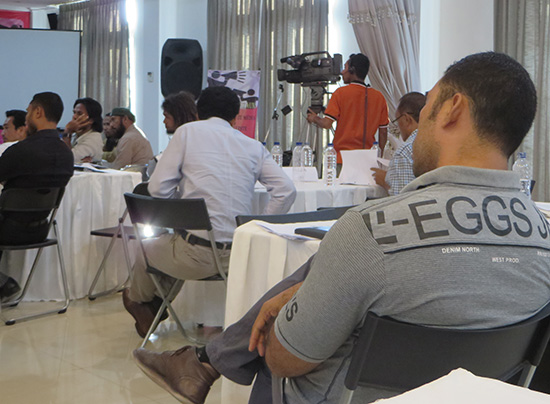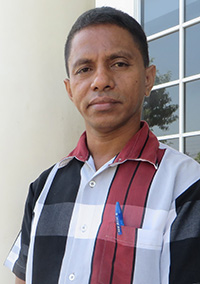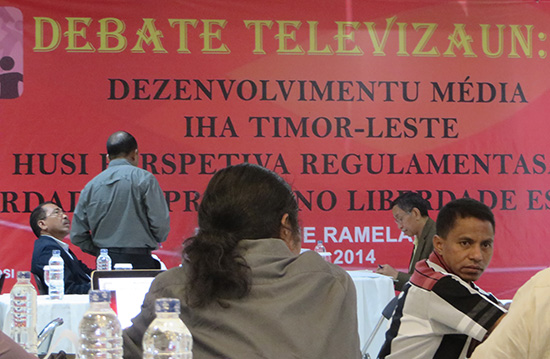
Special report by Shannon Gillies in Dili
Confusion reigns over a controversial media law adopted by Parliament but yet to be promulgated in the fledgling Asia-Pacific democracy of Timor-Leste.
Timor-Leste parliamentarians have adopted a new media law that does not differentiate between journalists and social media users, will impose licensing for journalists and a narrow definition of a “journalist” and potentially bars foreign journalists.
Journalists are expected to fall into line with the government’s media definitions and foreign reporters could be blocked at the country’s borders.
Parliament passed the law on May 6 that impacts on the press and rights of freedom of speech.
The President, Taur Matan Ruak, has 30 days to examine the law and has the right to veto it and send it back to parliament with any concerns he may have.
The law is available in Portuguese, which only a limited number of the Timor-Leste population understands, and the indigenous national language Tetun.
The government last week held a national debate attracting members of the press and human rights groups in the centre of Dili.
Delayed debate
Participants were allowed to ask questions and they were fielded by a member of Parliament.
People left in the middle of the debate after its scheduled start time was delayed several times during the day.
Originally scheduled to start at 10am, it was then delayed until 2.30pm and did not get going until after 3pm.
Charlie Scheiner, spokesperson for La’o Hamutuk, a local non-government organisation playing a leading role in providing public information and criticism, says the push for the media law was not from the grassroots in Timor-Leste.
But once the law is in place it makes no difference who is in charge of Parliament, the law will be set and journalists and all others will have to follow it.
“We think it’s important to look at what the law is. The fact that it passed in Parliament without any dissenting vote,” he says.
Lao’ Hamutuk has provided an English-language translation of the law on its website.
Tempo Semanal editor José Antonio Belo says he has informed Timor-Leste’s political leaders to get the paperwork ready for his arrest over his opposition.
Suppress media
He regards the law as being designed to suppress the media and to create an environment where people do not feel they can express their opinions freely.
The way the law is written is broad and there is no common interpretation of what the law means so that will make it hard to operate under, says Belo.
“There will be no forum for the people to speak. I have fought this law from day one.”
This law will force media owners to self-censor, he says.
“They tell the world this country is very democratic but it’s all lies. In the meantime they’re punishing the newspapers who are trying to tell the truth.”
The media law has been pushed by outside agencies as well as the Timor-Leste government, he says.
The law has been discussed and debated since the early 2000s by a United Nations group, the European Union, by Australia and by the US, says Belo.
“For me as a Timorese, I feel embarrassed by this.”
Different view
Asian Justice and Rights worker José Luis de Oliveira acknowledges he has a different take on what the law will do.
Timor-Leste needs a law to regulate the media to protect the public and the public need to be given a way to make complaints about their media, be believes.
Some media owners don’t want regulations because they enjoy a lot of liberty without responsibility, he says.
De Oliveria believes other parts of the law also need to be discussed.
He attacks the idea of foreign media having to be registered or having to let the government know that they are operating in Timor-Leste.
 Radio Liberdade director Francisco da Silva Gari strongly criticises the government’s move to implement media law changes.
Radio Liberdade director Francisco da Silva Gari strongly criticises the government’s move to implement media law changes.
He suggests the government ought to look into corruption before restricting a fledgling media industry.
Undermines laws
The law impacts on peoples’ rights to freedom of expression and undermines laws already passed by the East Timorese government, he says.
The government wants to dictate the qualification a journalist must have. It also wants journalists registered by a licence to operate and wants the power to revoke the licences.
Journalists and their media organisations will also be open to fines that Da Silva Gari believes are out of proportion to what a journalist earns and the small incomes Timor-Leste’s media organisations actually have.
Everyone in the country has a right to freedom of expression according to law, he says – and that means journalists as well.
People in Timor-Leste and expats living overseas want access to information about what is happening in the country and what the government is doing.
“This law restricts people who want to be journalists,” he says.
“The press council can stop a journalist working if they might be writing a story that is against their interest. They can withdraw the licence like that.
Asking permission
“Any journalists that come to Timor-Leste to cover stories [will] have to ask permission from the government. That is going back to the past.”
For the past 10 years Timor-Leste journalists have been using a code of ethics. Each media outlet also has its own code of ethics guiding them to produce their stories, he says.
Da Silva says the government should remember the role media played in gaining independence from Timor-Leste.
“The role of the media was very important by helping the community be distributing information. I think the leaders and politicians should think of this.”
Shannon Gillies is an independent New Zealand journalist based in Melbourne and a graduate of AUT University. She recently travelled to Timor-Leste.


MEDIA LAW STORIES
La’o Hamutuk media law debate resources
The Timor-Leste media law
English-language translation
Bad news from East Timor
Timor-Leste raises bar in media law supression - Cafe Pacific
RSF 'information hero' fights East Timor media law - Cafe Pacific
Sedition, e-libel become new Pacific media front line - Cafe Pacific
Parliament 'soft-pedals' over East Timor's harsh new media law - Cafe Pacific
Fighting for everybody's right to freed of expression, not just journalists - Cafe Pacific



